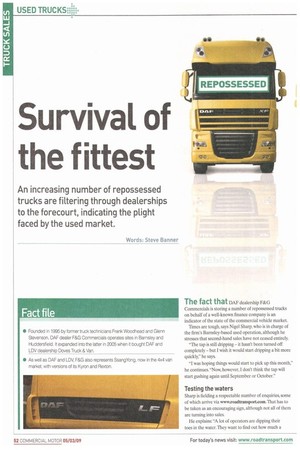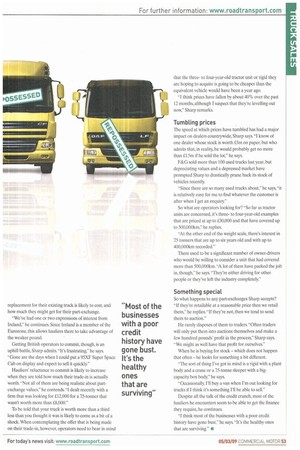Survival of the fittest
Page 52

Page 53

If you've noticed an error in this article please click here to report it so we can fix it.
An increasing number of repossessed trucks are filtering through dealerships to the forecourt, indicating the plight faced by the used market.
Words: Steve Banner The fact that DAF dealership F&G Commercials is storing a number of repossessed trucks on behalf of a well-known finance company is an indicator of the state of the commercial vehicle market.
Tunes are tough, says Nigel Sharp, who is in charge of the firm's Barnsley-based used operation, although he stresses that second-hand sales have not ceased entirely "The tap is still dripping — it hasn't been turned off completely — but I wish it would start dripping a bit more quickly," he says.
"I was hoping things would start to pick up this month," he continues."Now, however. I don't think the tap will start gushing again until September or October."
Testing the waters
Sharp is fielding a respectable number of enquiries, some of which arrive via www.roadtransport.com. That has to be taken as an encouraging sign, although not all of them are turning into sales.
He explains: 'A lot of operators are dipping their toes in the water. They want to find out how much a replacement for their existing truck is likely to cost, and how much they might get for their part-exchange.
"We've had one or two expressions of interest from Ireland," he continues. Since Ireland is a member of the Eurozone, this allows hauliers there to take advantage of the weaker pound.
Getting British operators to commit, though, is an uphill battle, Sharp admits. "It's frustrating," he says. "Gone are the days when I could put a 95XF Super Space Cab on display and expect to sell it quickly."
Hauliers' reluctance to commit is likely to increase when they are told how much their trade-in is actually worth. "Not all of them are being realistic about partexchange values," he contends."I dealt recently with a firm that was looking for £12,000 for a 7.5-tonner that wasn't worth more than £8,000."
To be told that your truck is worth more than a third less than you thought it was is likely to come as a bit of a shock. When contemplating the offer that is being made on their trade-in, however, operators need to bear in mind that the threeto four-year-old tractor unit or rigid they are hoping to acquire is going to be cheaper than the equivalent vehicle would have been a year ago.
"I think prices have fallen by about 40% over the past 12 months, although I suspect that they're levelling out now," Sharp remarks.
Tumbling prices
The speed at which prices have tumbled has had a major impact on dealers countrywide, Sharp says, "I know of one dealer whose stock is worth £3m on paper, but who admits that, in reality, he would probably get no more than £1.5m if he sold the lot," he says.
F&G sold more than 100 used trucks last year, but depreciating values and a depressed market have prompted Sharp to drastically prune back its stock of vehicles recently.
"Since there are so many used trucks about," be says, "it is relatively easy for me to find whatever the customer is after when I get an enquiry."
So what are operators looking for? "So far as tractor units are concerned, it's threeto four-year-old examples that are priced at up to 00,000 and that have covered up to 500,000km." he replies.
"At the other end of the weight scale, there's interest in 7.5 tonners that are up to six years old and with up to 400,000km recorded."
There used to be a significant number of owner-drivers who would be willing to consider a unit that had covered more than 500,000km."A lot of them have packed the job in, though," he says. "They're either driving for other people or they've left the industry completely."
Something special
So what happens to any part-exchanges Sharp accepts? "If they're retailable at a reasonable price then we retail them," he replies. "If they're not, then we tend to send them to auction."
He rarely disposes of them to traders. "Often traders will only put them into auctions themselves and make a few hundred pounds' profit in the process," Sharp says. "We might as well have that profit for ourselves."
When he is buying for stock — which does not happen that often — he looks for something a bit different.
"The sort of thing I've got in mind is a rigid with a plant body and a crane or a 7.5-tonne sleeper with a bigcapacity box body," he says.
"Occasionally. I'll buy a van when I'm out looking for trucks if I think it's something Ill be able to sell."
Despite all the talk of the credit crunch, most of the hauliers he encounters seem to be able to get the finance they require, he continues.
"T think most of the businesses with a poor credit history have gone bust," he says. "It's the healthy ones that are surviving." a
















































































































































